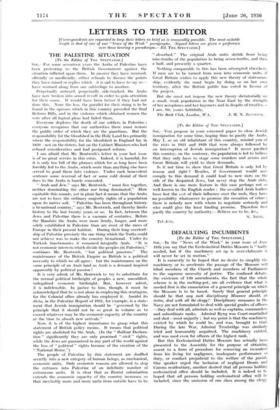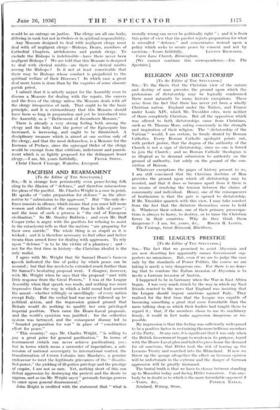DEFAULTING INCUMBENTS [To the Editor of THE SPECTATOR.]
SIR,—In the "News of the Week" in your issue of June 19th you say that the Ecclesiastical Duties Measure is " badly needed, but if the machinery set up is over-elaborate it will never be set in motion."
It is earnestly to be hoped that no desire to simplify the machinery or to accelerate the passage of the Measure will blind members of the Church and members of Parliament to the supreme necessity of justice. The confused debate, the existence of 130 amendments, the fact that the whole scheme is in the melting-pot, are all evidence that what is needed first is the enunciation of a general principle on which the Measure is to be based. Surely that general principle should be that any such disciplinary Measure should, ab inilfo, deal with all the clergy? Disciplinary measures in the Navy are not formulated to deal with special grades of officers —they deal with all, admirals as well as captains, conunanders and subordinate ranks. Admiral Byng was Court-martialled and shot—most unjustly ; but my point is that the machinery existed by which he could be, and was, brought to trial. During the late War, Admiral Troubridge was similarly tried and honourably acquitted. The machinery existed, and was used even for officers of the highest rank.
But this Ecclesiastical Duties Measure has actually been
presented to the Assembly for the purpose of obtaining assent to a form of procedure for removing an incumbent from his living for negligence, inadequate performance of duty, or conduct prejudicial to the welfare of the parish. One speaker urged the inclusion of negligent Deans and Canons residentiary, another desired that all persons holding ecclesiastical office should be included. It is indeed to be hoped that all persons holding ecclesiastical office will be included, since the omission of one class among the clergy would be an outrage on justice. The clergy are all one body, differing in rank but not in Orders or in spiritual responsibility.
Any Measure designed to deal with negligent clergy must deal with all negligent clergy—Bishops, Deans, members of Cathedral Chapters, archdeacons and parish clergy. To exclude the Bishops is indefensible—have there never been negligent Bishops ? We are told that this Measure is designed to deal with clerical misfits—are there no clerical misfits among the Bishops ? Is it not at least conceivable that there may be Bishops whose conduct is prejudicial to the spiritual welfare of their Dioceses ? In which case a great deal more harm is done than by the vagaries of some obscure parish priest.
I submit that it is utterly unjust for the Assembly even to discuss a Measure for dealing with the repute, the careers and the lives of the clergy unless the Measure deals with all the clergy irrespective of rank. That ought to be the basic principle, and it is extraordinary that this Measure should have been so long in preparation and yet be introduced into the Assembly as a " Retirement of Incumbents Measure."
There is already a very strong feeling both among the clergy and the laity that the power of the Episcopate has increased, is increasing, and ought to be diminished. A disciplinary measure which is aimed at one section only of the clergy, and that the most defenceless, is a Measure for the Increase of Prelacy, since the episcopal Order of the clergy would be exempt from that criticism, indictment and punish- ment which is so lightly proposed for the delinquent lesser











































 Previous page
Previous page